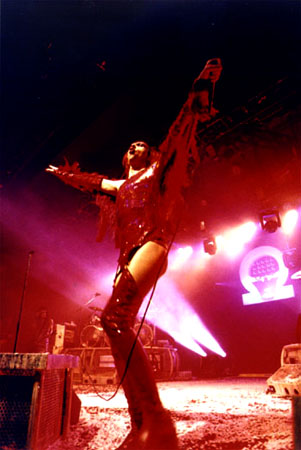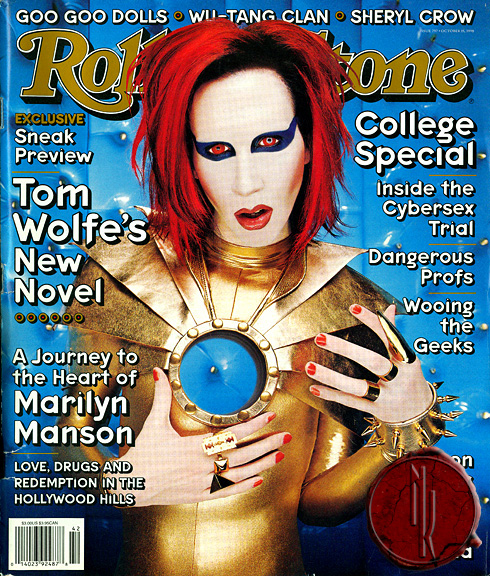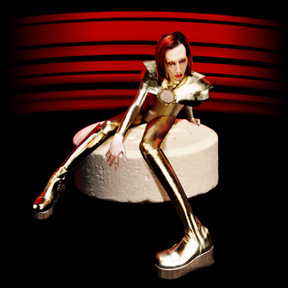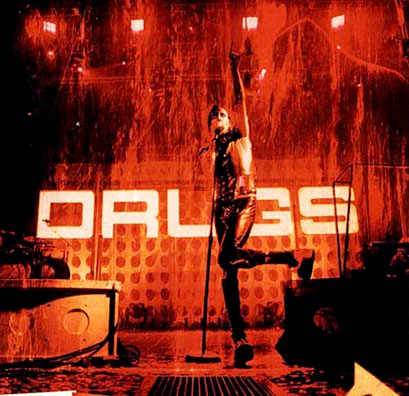the NachtKabarett
 Manson as Omēga, on the 1998 Mechanical Animals tour. The second act of the concert performance, following Manson's performing as The Androgyne and directly preceding Manson's emergence on the podium as the Antichrist Svperstar
Manson as Omēga, on the 1998 Mechanical Animals tour. The second act of the concert performance, following Manson's performing as The Androgyne and directly preceding Manson's emergence on the podium as the Antichrist Svperstar"All that glitters is cold"Marilyn Manson, 'Posthuman'
"All that glitters is gold" is a line in Led Zepplin's 1970's rock anthem 'Stairway to Heaven', in turn a deviation of Shakespeare's famous maxim, "All that glitters is not gold." The latter is a popular phrase used in reference to outward appearances not always being as they seem; on a superficial, surface level something may appear outwardly much more valuable than it in reality is. It's origins are found in Shakespeare's play, 'The Merchant of Venice', where the The Prince of Morocco, upon realizing the morbid error of his obsession with superficial beauty, exclaims:
"All that glisters is not gold; / Often have you heard that told. / Many a man his life hath sold / But my outside to behold. / Gilded tombs do worms enfold."Shakespeare, 'The Merchant of Venice (II, vii)
 "We Were Hardworn Automatic And As Hollow As The "O" In God." Marilyn Manson ; hollow and (literally) transparent as evocative of the personification of Omēga during the 'Mechanical Animals' era | Rolling Stone magazine September 1998, the same month of the release of 'Mechanical Animals' and wearing the same "glittering" and golden shining outfit as within the album artwork.
"We Were Hardworn Automatic And As Hollow As The "O" In God." Marilyn Manson ; hollow and (literally) transparent as evocative of the personification of Omēga during the 'Mechanical Animals' era | Rolling Stone magazine September 1998, the same month of the release of 'Mechanical Animals' and wearing the same "glittering" and golden shining outfit as within the album artwork.In The End I Became Them And I Led ThemUntitled, track 15 of 'Mechanical Animals'
After All None Of Us Really Qualified as Humans
We Were Hardworn Automatic And As Hollow As The "O" In God
I Reattached My Emotions Cellular And Narcotic
From The Top Of Hollywood It Looked Like Space
Millions Of Capsules And Mechanical Animals
A City Full Of Dead Stars And A Girl I Called Coma White
This Is My Omēga
During the 'Mechanical Animals' era, Manson personified Omēga, an exaggerated and hollow rockstar who sung empty anthems about sex, drugs and fame. As discussed thoroughly throughout The NACHTKABARETT (see namely the articles, Mercury: The Androgyne and Coma White for a summation on Manson's persona during 'Mechanical Animals' and 'Holy Wood'), the outwardly hollow Omēga was to act as a counterpart to the reverse and introspective side of the album. Manson in keeping with numerological significances, split both aspects of the album in half with 7 songs by the fictitious 'Omēga & the Mechanical Animals' and the inverse 7 songs being the sincere, melancholic and introspective side of the album.
"Build a new god to medicate and to ape, Sell us ersatz dressed up and real fake"'Rock is Dead' - The signature and purposely "over the top hollow rock anthem" of 'Mechanical Animals'
It was a satire that most fans and critics missed during the era but was better understood within the context of the three Triptych albums, following Holy Wood's release in 2000. However Manson did leave clues in interviews and quotes on MarilynManson.com on the nature of the personification. Criticism and misunderstanding was due in large part to the new image Manson had adopted; discarding the all-black leather & vinyl "goth" aesthetic for sequined tops, dayglo colors, red hair and brighter makeup in homage to Bowie, T-Rex (Marc Bolan) and other 1970's glam rock pioneers who epitomized the concept of rock stardom. In response to this criticism Manson made numerous statements to the fact that his current embodiment had much less to do with a visual and thematic departure of how the world had become familiar with Marilyn Manson, but instead it was another dimension of the concept.
 Manson, within the 'Mechanical Animals' album booklet in the outift which he appeared on the September 1998 cover of Rolling Stone. Within the cover shot, his chest through the hole in the gold outfit was made transparent, showing only the background wall behind him to illustrate, in an artistic fashion, the hollow nature Omēga embodies.
Manson, within the 'Mechanical Animals' album booklet in the outift which he appeared on the September 1998 cover of Rolling Stone. Within the cover shot, his chest through the hole in the gold outfit was made transparent, showing only the background wall behind him to illustrate, in an artistic fashion, the hollow nature Omēga embodies.Manson directly addressed this issue on a MarilynManson.com webcast preceding the release of Mechanical Animals on September 15, 1998 (another deliberate numerological reference with the number 15 appearing throughout the album). The webcast took place in the first week of September and was specifically a short overview of the direction the band was heading in, followed by a Q&A of fan submitted questions online. The song 'Posthuman' was made available to the fans in Liquid Audio format as a gift (a file that expired on the release date of the album).
One fan question was toward the nature of the new era, imagery and themes, what it represented and whether or not it was Manson's "sell out" or betrayal his fans who identified with his previous incarnations. Manson responded thusly that it most absolutely was not a betrayal and encouraged the fans to look beneath the flashy veneer to see that it actually reveals something "much darker," on an internal level.
"All that glitters is cold", which Manson sung through a voice modulator within 'Posthuman', a song contained on the introspective side of the album, alludes to this very concept. That being, although the rock god Omēga is donned in bright designer wardrobe and is a superhuman demagogue amongst men, he is empty and hollow underneath the ersatz. In turn, Mechanical Animals in one half illustrates Omēga's stardom with the other half illustrates his internal human loneliness.

Alternative Press. 'Manson World'. April 1999.ALTERNATIVE PRESS: What are the defining characteristics of Omēga as opposed to Antichrist Svperstar?
MARILYN MANSON: Making Mechanical Animals was, for me, like stepping foot into the world for the first time. I felt very vulnerable. I got involved in a relationship and fell in love, I think for the first time. And I started to feel empathy for other people. It wasn't so much I found God or became a pussy and decided to start giving money to vagrants; nothing like that. I just started to find the balance that I'd always preached about, you know? In the past I always talked about finding a place in my life where I combined extremes. But everything was very much more "Manson", for lack of a better word. And with Mechanical Animals, it became more "Marilyn". I think I've got a real dynamic now, not just in music but in life.
AP: But some people are loath to let go of the old you - the san-of-Satan thing that seems a little old hat for you now.
MM: Well, it's not something that I've forsaken or grown out of. I think it's just now another dimension. Some people are just used to things being an act, or things being one-dimensional and easily defined. But I've always felt that rather than being just one thing, why not be many? That's the way I look at the performance - it makes the performance so much more xciting to open up different parts of my head. Antichrist Svperstar was just the extreme. It just seems.... it probably seems like a multiple personality disorder. To me it seems normal. I think it is normal, and I think everybody has that in them. People are just often afraid to let loose.
AP: think some of the public is a little reluctant to accept the move to glam and fashion from the purely demonic image. And the Omēga character seems a bit more complex than the Antichrist Svperstar character, which was very easy to read. Any connection?
MM: Yeah, I think so. I think because this album was inspired by the movie that I want to make, I probably didn't fill in all the blanks on the record. But I really just mirrored my own lifestyle at the time. And Omēga's not really a character, by the way - I wouldn't create something that's not me. But I think a lot of people expected me to continue to speak about religion, even the people who hated me for it, as well as all the fans who loved me for it. But I felt like I had said everything I had to say - and making Antichrist Svperstar changed my life, made me into something stronger. What I didn't realize was that to be stronger I needed to have emotions, and that was something I had to shut off to make that record. So Mechanical Animals was like being born again. I guess the image on the album cover was about the alienation. And having an image that is hard to understand was probably what I was trying to say. That people didn't understand was kind of what I was saying in the album.